On April 16, the sea-gulls in the Karatsu
Bay must have been very surprised because
the East Wharf of Karatsu Port was suddenly
crowded with people.
This port used to be a prosperous port, from
which coal was shipped in the Meiji and Taisho
Eras, and fish in the Showa Era.
While these two or three decades, this has
been a lonesome place.
But this day, what attracted the citizen
to run to this wharf?
A Raft was coming from the Past!
|
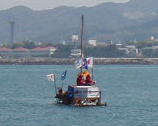 |
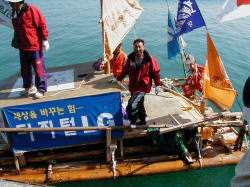 |
This simple raft of ten cedar logs tied together
was 6meters long and 3meters wide. It had
a mast, and hanging from the pole there was
a kind of cloth, which you might call a sail.
On the raft, there was a low wooden box of
2meters square of ceiling, and one side of
the low walls was open. Somebody told me
that from this entrance people could crawl
in it and use this box as a comfortable bed
room for three people together. |
Karatsu people welcomed this raft enthusiastically.
We waved small flags of both
Korea and Japan.
Many Korean people living in Japan were here
in their traditional dresses.They were so
beautiful. The graceful long skirts were
also waving their welcome in the spring sea-breeze. |
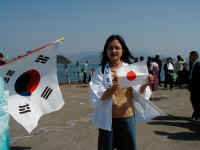 |
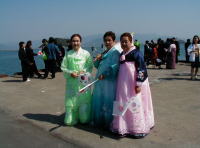 |
|
Among these people there was an energetic
Korean lady. Her name is Yu Hwa-Jun.
She is the representative of 'Genkai-Jin
Club', which aims at mutual understanding
and friendship between Korea and Japan. My
husband and I are members of this club. |
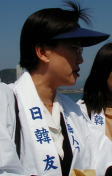 |
Then, what is this raft for?
Why do you think I called this 'The Raft
from the Past'? |
In the southern part of Korean Peninsula,
there is a place called Yeong-am. An ancient
scholar 'Wang-In Baksa(meaning Doctor)' was
born in this sea-side county. Wang-In was
a great scholar in the time of Paekche about
1600years ago.
At that time, Japan was almost unified and
the Emperor Ohjin wanted to have the culture
of letters. Those cultures like art, architecture,
laws and systems of the government and religions
were flowing into Japan through the gateway
of this northern Kyushu. Karatsu was one
of the nearest gates from Korea. |
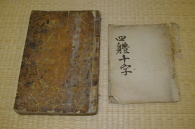 |
Wang-In probably sailed from
Yeong-Am stopping
at Tsushima and Iki Islands waiting
for the
proper winds and proper tides,
with the high
risk of the lives of the crew.
Many high-ranked priests of both
Korea and
Japan died in the sea without
reaching the
goal.
But Wang-In succeeded, and gave to the Emperor
the wonderful gifts of 'The Thousand Letters'
and 'The Analects of Confucius'
We Japanese owe him for the letters and other
cultures with which Japan grew
its backbone.
Wang-In had his influence widely in that
time of Japanese government. He never went
back to his own country. His grave is in Hirakata-City near Osaka. |
At his birthplace, in every April, they hold
a festival to celebrate Wang-In's birthday.
In this year 2001 , it was a special one, and they decided
to go over the sea on the ancient style raft
trying to send the message of the history. , it was a special one, and they decided
to go over the sea on the ancient style raft
trying to send the message of the history.
The Genkai Sea, between Korea
and Kyushu,
is famous for its rough waves.
It seemed
to be a dangerous project.
A tugboat accompanied it. But the raft was
rowed almost 100 percent by human hands.
It must have been a rough and tough voyage
of 6 days.
I am so glad that they survived. |
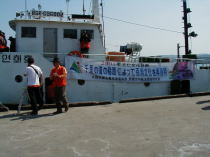 |
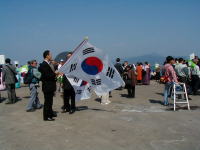 |
There was a welcome ceremony with many speeches
and flowers.
The speeches by the host and the visitor
captain of the raft were both wonderful. |
Our respected old man, Mr. Hikoki Takeo,
made an amazing speech without glancing at
a note.
He explained the history of old Japan and
the achievement of the great Wang-In about
1500 years ago. Mr. Takeo said, "I am
only 90years young, so I do not know about
1500 years' past. But I can imagine how hard
the journey was and how much it meant to
Japan. So let me welcome you with all the
compassion and gratitude of ancient Japanese
people.'
I hope the translator could have translated
his wonderful speech well.
|
The Captain of the Crew made another beautiful
speech. Later I found that he was a poet.
It was natural that his speech sounded like
a poem.
|
The 5 crewmen of the raft and the 16 of the
boat did not have any reservation for the
accommodation for that night. So we offered
and they stayed with us in Yoyokaku. We had
an exciting party.
Captain Che Ba-da's suntanned face broke
into a big attractive smile, and his deep
voice sounded like poems here too.
I now believe that Doctor Wang-In of 1600
years ago must have been a fantastic person
like this poet. |
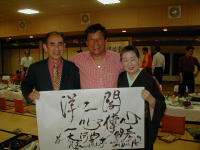 |
Now I am more than sure of one thing.
Korea and Japan, specially Karatsu,
are so
close to each other.
To cross this sea!
However dangerous it may have been, it was
possible with a primitive method of voyage.
I hope Karatsu will serve forever and ever
as the gateway of the communication and friendship
between the two countries.
|
, it was a special one, and they decided to go over the sea on the ancient style raft trying to send the message of the history.










